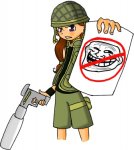-
Christian Chat is a moderated online Christian community allowing Christians around the world to fellowship with each other in real time chat via webcam, voice, and text, with the Christian Chat app. You can also start or participate in a Bible-based discussion here in the Christian Chat Forums, where members can also share with each other their own videos, pictures, or favorite Christian music.
If you are a Christian and need encouragement and fellowship, we're here for you! If you are not a Christian but interested in knowing more about Jesus our Lord, you're also welcome! Want to know what the Bible says, and how you can apply it to your life? Join us!
To make new Christian friends now around the world, click here to join Christian Chat.
Self-defense? Absolutely, especially if one is defending one's person or liberty against an oppressive and tyrranical government. The Second Amendment is abundantly clear and wonderful in its simplicity, and any additional clarity needed by anyone doubting the original intent of the Second Amendment should refer to The Federalist Papers. If ever the concerns of the Founding Fathers are more well-based, it's the present times in which we live.
It bothers me too. Our differences.
I find myself dealing with ''American Christians'', rather than just Christians. I have said earlier, I think if people feel the need to constantly protect themselves with a gun then they should have one, for their peace of mind.
You can protect your livestock. From bears, or other wildlife. I don't consider that un-Christian.
Btw- I noticed that you posted in the thread pertaining to wrongful usage of guns. I think that in itself, is hopeful that you don't venerate a weapon. Good for you. I think that's worthy of mention and commendable.
A question of curiosity- Are you allowed to carry your gun in malls and airports? Do you have metal detectors or security scanners, in subways etc.
I find myself dealing with ''American Christians'', rather than just Christians. I have said earlier, I think if people feel the need to constantly protect themselves with a gun then they should have one, for their peace of mind.
You can protect your livestock. From bears, or other wildlife. I don't consider that un-Christian.
Btw- I noticed that you posted in the thread pertaining to wrongful usage of guns. I think that in itself, is hopeful that you don't venerate a weapon. Good for you. I think that's worthy of mention and commendable.
A question of curiosity- Are you allowed to carry your gun in malls and airports? Do you have metal detectors or security scanners, in subways etc.
I don't venerate weapons. I hope, with Heaven as my witness, that I venerate God alone. I also use hammers at my place, but I have no reverence for them either. A weapon is one of the many tools I use. Many of the tools I have can seriously hurt someone if used improperly, so I am careful with them all. (I have an eternal reminder of that, a chisel scar on my left index finger.)
I can't say I have met anyone in America that I thought venerated weapons. To my knowledge, all of my friends and neighbors believe firmly that misuse of firearms can and should be punished.
The carrying of weapons is a complicated issue, which varies from state to state. Where I live, there are definitely restrictions on where you can carry weapons, for instance I know they are not allowed at the local colleges. (Unfortunately, this does not prevent all shootings at our colleges, but that's a different story.) You may not hide a weapon in your vehicle unless you pass both a background check and a firearms competency test.
I live in a rural area, and we often see men and women at the corner store with rifles in the cabs of their trucks. They are usually in the process of heading to a place where they are allowed to hunt game, and are getting a snack. Or, they have bagged an animal, and are checking it in at the store. (For the local game department to keep a tally of animals taken.) This is becoming a thing of the past though, as you can now call in a successful hunt of your cell phone. My point here is that the folks of the county are not frightened by the sight of their neighbors armed with high-powered rifles, it is an everyday happening in the fall and winter, here in rural Virginia.
I don't live near any subways, but I know there are some metal detectors at subways around our country. Again, a lot of these things vary from state to state. I have been to a mall one time in the last 15 years or so, and I am not sure what the laws are there. I didn't see anyone armed (barring a security officer), but I'd have to check on the laws for that.
A
A small number of child soldiers in a handful of lawless countries where no rule of law is enforced whatsoever that are undergoing Civil War has zero to do with this topic.
In my opinion, only an ignorant person or one who knows better but lacks integrity would try to construct such a fallacious correlation for the purpose of robbing people of their liberty and the ability to teach their young people gun safety and responsibility.
In logic this is called the 'Appeal To Extremes' fallacy. Click here: Appeal to Extremes
To see what proper gun safety training for young people looks like, one only need visit a reputable scouting organization:
Read: Shooting Sports and FAQs

In my opinion, only an ignorant person or one who knows better but lacks integrity would try to construct such a fallacious correlation for the purpose of robbing people of their liberty and the ability to teach their young people gun safety and responsibility.
In logic this is called the 'Appeal To Extremes' fallacy. Click here: Appeal to Extremes
To see what proper gun safety training for young people looks like, one only need visit a reputable scouting organization:
Read: Shooting Sports and FAQs

Problem with our modern translations is they really do a poor job of conveying what the originals actually meant. The language of the time. Idioms.
Self-defense?
The backdrop to this teaching is that the Jews considered it an insult to be hit in the face, much in the same way that we would interpret someone spitting in our face. Bible scholar R. C. Sproul comments: "What's interesting in the expression is that Jesus specifically mentions the right side of the face [Matthew 5:39]....If I hit you on your right cheek, the most normal way would be if I did it with the back of my right hand....To the best of our knowledge of the Hebrew language, that expression is a Jewish idiom that describes an insult, similar to the way challenges to duels in the days of King Arthur were made by a backhand slap to the right cheek of your opponent."
Prior to His crucifixion, Jesus revealed to His disciples the future hostility they would face and encouraged them to sell their outer garments in order to buy a sword (Luke 22:36-38; cf. 2 Corinthians 11:26-27). Here the "sword" (Greek: maxairan) is a dagger or short sword that belonged to the Jewish traveler's equipment as protection against robbers and wild animals. A plain reading of the passage indicates that Jesus approved of self-defense.
Self-defense may actually result in one of the greatest examples of human love. Christ Himself said, "Greater love has no one than this, that he lay down his life for his friends" (John 15:14). When protecting one's family or neighbor, a Christian is unselfishly risking his or her life for the sake of others.
Theologians J. P. Moreland and Norman Geisler say that "to permit murder when one could have prevented it is morally wrong. To allow a rape when one could have hindered it is an evil. To watch an act of cruelty to children without trying to intervene is morally inexcusable. In brief, not resisting evil is an evil of omission, and an evil of omission can be just as evil as an evil of commission. Any man who refuses to protect his wife and children against a violent intruder fails them morally."
Self-defense?
The backdrop to this teaching is that the Jews considered it an insult to be hit in the face, much in the same way that we would interpret someone spitting in our face. Bible scholar R. C. Sproul comments: "What's interesting in the expression is that Jesus specifically mentions the right side of the face [Matthew 5:39]....If I hit you on your right cheek, the most normal way would be if I did it with the back of my right hand....To the best of our knowledge of the Hebrew language, that expression is a Jewish idiom that describes an insult, similar to the way challenges to duels in the days of King Arthur were made by a backhand slap to the right cheek of your opponent."
Prior to His crucifixion, Jesus revealed to His disciples the future hostility they would face and encouraged them to sell their outer garments in order to buy a sword (Luke 22:36-38; cf. 2 Corinthians 11:26-27). Here the "sword" (Greek: maxairan) is a dagger or short sword that belonged to the Jewish traveler's equipment as protection against robbers and wild animals. A plain reading of the passage indicates that Jesus approved of self-defense.
Self-defense may actually result in one of the greatest examples of human love. Christ Himself said, "Greater love has no one than this, that he lay down his life for his friends" (John 15:14). When protecting one's family or neighbor, a Christian is unselfishly risking his or her life for the sake of others.
Theologians J. P. Moreland and Norman Geisler say that "to permit murder when one could have prevented it is morally wrong. To allow a rape when one could have hindered it is an evil. To watch an act of cruelty to children without trying to intervene is morally inexcusable. In brief, not resisting evil is an evil of omission, and an evil of omission can be just as evil as an evil of commission. Any man who refuses to protect his wife and children against a violent intruder fails them morally."
'Love your enemies, do good to those who curse you, pray for those who mistreat you'.
The same way, if being slapped on my own face is a jewish insult, then to turn the other cheek for someone to slap the other side, is to say 'do as you want with me because I offer no retribution'.
'For vengeance is God's'
The same way, to lay down your life for a brother, is not the same as to take a life for your brother. If we only value or love those close to us, then we're no better than anyone who doesn't know holiness. 'For don't even the pagans do that?'
Jesus says 'put away your sword, for those who live by the sword, die by the sword', and heals the ear of the guard who was struck, then proceeds to let the Jews take him, incarcerate him, brutalize him and crucify him for the sakes of the same people who are doing it. Jesus healed one of the men who was involved in his capture, and by proxy his execution, and rebuked his own brother for striking. What more can be said than that, as a statement of non-violence towards enemies?
Jesus says 'there is no greater love than this, that a man give up his life for others'. When he said this, he wasn't talking about 'fighting those' and 'killing those' in order to 'save these', he was talking about his own style of sacrifice. Giving himself up willingly and without violence, IN PLACE of another, that he might save them. The 'others' he talks about in this sentence are 'the world'. Jesus willing GAVE his life up. To GIVE one's life up is to offer no resistance. This statement is Jesus reassuring the disciples, 'I love you more than you can know'.
Finally, the statement 'sell your coverings that you may buy yourself a sword', read the lines before and after. It would make no sense that Jesus would advocate the violence considering what he says afterward. Jesus himself has said that he has a 'two-edged sword', however it isn't a literal one. It becomes self evident as you read.
Then Jesus asked them, “When I sent you out without purse, bag or sandals, did you lack anything?”“Nothing,” they answered.He said to them, “But now if you have a purse, take it, and also a bag; and if you don’t have a sword, sell your cloak and buy one. It is written: ‘And he was numbered with the transgressors’; and I tell you that this must be fulfilled in me. Yes, what is written about me is reaching its fulfillment.”The disciples said, “See, Lord, here are two swords.”“That’s enough!” he replied.Jesus went out as usual to the Mount of Olives, and his disciples followed him. On reaching the place, he said to them,“Pray that you will not fall into temptation.” He withdrew about a stone’s throw beyond them, knelt down and prayed, “Father, if you are willing, take this cup from me; yet not my will, but yours be done.” An angel from heaven appeared to him and strengthened him. And being in anguish, he prayed more earnestly, and his sweat was like drops of blood falling to the ground.When he rose from prayer and went back to the disciples, he found them asleep, exhausted from sorrow. “Why are you sleeping?” he asked them. “Get up and pray so that you will not fall into temptation.”While he was still speaking a crowd came up, and the man who was called Judas, one of the Twelve, was leading them. He approached Jesus to kiss him, but Jesus asked him, “Judas, are you betraying the Son of Man with a kiss?”When Jesus’ followers saw what was going to happen, they said, “Lord, should we strike with our swords?” And one of them struck the servant of the high priest, cutting off his right ear.But Jesus answered, “No more of this!” And he touched the man’s ear and healed him.Then Jesus said to the chief priests, the officers of the temple guard, and the elders, who had come for him, “Am I leading a rebellion, that you have come with swords and clubs? Every day I was with you in the temple courts, and you did not lay a hand on me. But this is your hour—when darkness reigns.”
Last edited:
A small number of child soldiers in a handful of lawless countries where no rule of law is enforced whatsoever that are undergoing Civil War has zero to do with this topic.
In my opinion.....
In my opinion.....
The topic of the thread is usage of guns for self defense. Clearly the children were defending themselves, and their country with guns.
Oh and Mr. AoK, you haven't gotten back to us on the findings on abortion that Steven Levitt has posted (it's available online freely), that we kindly asked you to validate for the benefit of all Christians.
In my opinion, only an ignorant person or one who knows better but lacks integrity would try to construct such a fallacious correlation ....
In logic this is called the 'Appeal To Extremes' fallacy. Click here: Appeal to Extremes
In logic this is called the 'Appeal To Extremes' fallacy. Click here: Appeal to Extremes
So you've resorted to making a nasty personal attack in calling me a fool because I made a joke about Chuck Norris and quiche. *rolls eyes*.
I think we know who's behind that choice of yours Praus:
[video=youtube_share;62Qfbrc1jdo]http://youtu.be/62Qfbrc1jdo[/video]
I think we know who's behind that choice of yours Praus:
[video=youtube_share;62Qfbrc1jdo]http://youtu.be/62Qfbrc1jdo[/video]
A
According to the authors of Cato’s study titled 'Tough Targets: when criminals face armed resistance from citizens' on how often guns are used by citizens to prevent crime, “tens of thousands of crimes are prevented each year by ordinary citizens with guns.”
Their study chose 5,000 news reports involving guns randomly over an eight-year period. The results showed that the mere presence of an armed citizen thwarts many crimes, even beyond those that are reported by the police and subsequently printed in the newspaper.
Of the 5,000 incidents reported between October 2003 and November 2011, 488 involved home burglaries along with another 1,227 incidents where intruders fled when confronted by armed inhabitants. Another 34 concerned pizza delivery drivers defending themselves, along with 172 animal attacks.
Concerns about an attacker taking a gun away from an armed victim were proven invalid, with 227 incidents reported where the intended victim disarmed his attacker, while just 11 attackers disarmed his victim.
Twenty-five rapes were avoided by armed victims. Two hundred and one attacks were neutralized by armed senior citizens (e.g. over age 65).
The study also put into perspective the number of accidental shootings that were reported to the papers in that eight-year period. Although the Centers for Disease Control reported 535 accidental shootings in 2006, the authors found only five in their database. The study also identified 36 cases where the defender lost his life during the incident but that compares to the 210 cases where the perpetrator was shot by his intended victim. Sixty-five carjackings were successfully ended by an armed citizen who used his weapon to defend himself.
Some objections to gun ownership include concerns that ordinary citizens aren’t capable of owning and handling a gun responsibly or that they will be likely to engage in “road rage” with potentially tragic consequences. Such objections hold little water. Cramer and Burnett wrote: “This paper finds that such cases represent an exceedingly small minority of gun uses by otherwise law-abiding citizens…. Those assumptions are false. The vast majority of gun owners are ethical and competent.”
The authors were quick to note deficiencies in the study, notably the underreporting of incidents where an armed citizen defended himself but never made the papers. They said:
"Moreover, it is important to note that when a gun owner kills an attacker or is able to hold a rapist or a burglar until the police arrive, it is very likely that more than one crime has been prevented because if the culprit had not been stopped, he could have targeted other citizens as well."
More information: Guns Used in Self-defense
Their study chose 5,000 news reports involving guns randomly over an eight-year period. The results showed that the mere presence of an armed citizen thwarts many crimes, even beyond those that are reported by the police and subsequently printed in the newspaper.
Of the 5,000 incidents reported between October 2003 and November 2011, 488 involved home burglaries along with another 1,227 incidents where intruders fled when confronted by armed inhabitants. Another 34 concerned pizza delivery drivers defending themselves, along with 172 animal attacks.
Concerns about an attacker taking a gun away from an armed victim were proven invalid, with 227 incidents reported where the intended victim disarmed his attacker, while just 11 attackers disarmed his victim.
Twenty-five rapes were avoided by armed victims. Two hundred and one attacks were neutralized by armed senior citizens (e.g. over age 65).
The study also put into perspective the number of accidental shootings that were reported to the papers in that eight-year period. Although the Centers for Disease Control reported 535 accidental shootings in 2006, the authors found only five in their database. The study also identified 36 cases where the defender lost his life during the incident but that compares to the 210 cases where the perpetrator was shot by his intended victim. Sixty-five carjackings were successfully ended by an armed citizen who used his weapon to defend himself.
Some objections to gun ownership include concerns that ordinary citizens aren’t capable of owning and handling a gun responsibly or that they will be likely to engage in “road rage” with potentially tragic consequences. Such objections hold little water. Cramer and Burnett wrote: “This paper finds that such cases represent an exceedingly small minority of gun uses by otherwise law-abiding citizens…. Those assumptions are false. The vast majority of gun owners are ethical and competent.”
The authors were quick to note deficiencies in the study, notably the underreporting of incidents where an armed citizen defended himself but never made the papers. They said:
"Moreover, it is important to note that when a gun owner kills an attacker or is able to hold a rapist or a burglar until the police arrive, it is very likely that more than one crime has been prevented because if the culprit had not been stopped, he could have targeted other citizens as well."
More information: Guns Used in Self-defense
Mass Shootings?
[video=youtube;-OmZvyNrzAs]https://www.youtube.com/watch?v=-OmZvyNrzAs[/video]
Phan Thi Kim Phuc

Perhaps the real question should be...
[video=youtube;-OmZvyNrzAs]https://www.youtube.com/watch?v=-OmZvyNrzAs[/video]
Phan Thi Kim Phuc

Perhaps the real question should be...
View attachment 71945
...................






